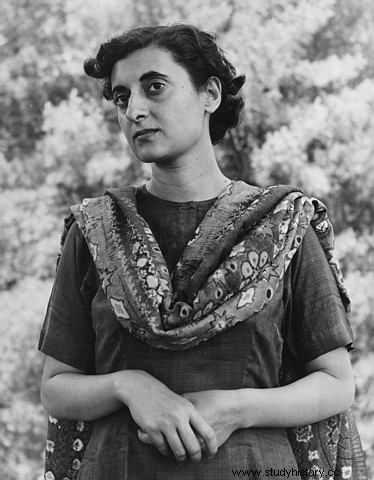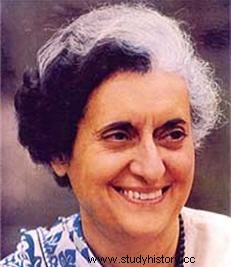Indira Priyadarshini Nehru, better known as Indira Gandhi (1917-1984), was an Indian politician. Prime Minister of India from 1966 to 1977, she is the second woman in the world democratically elected to head a government.
Prime Minister
 Only daughter of Jawaharlal Nehru and his wife Kawala, Indira Nehru was born on November 19, 1917 in India. Her father, secretary general of the Congress party, was imprisoned several times by the British during her childhood but, corresponding with her from prison, he watched over her education. After attending school in Poona, Indira went to study in Europe, Oxford and Switzerland, then returned to India.
Only daughter of Jawaharlal Nehru and his wife Kawala, Indira Nehru was born on November 19, 1917 in India. Her father, secretary general of the Congress party, was imprisoned several times by the British during her childhood but, corresponding with her from prison, he watched over her education. After attending school in Poona, Indira went to study in Europe, Oxford and Switzerland, then returned to India.
In 1937, Indira joined the Indian National Congress which fought for Indian independence. In 1942, her activities in Congress landed her in prison for six months. She married Feroze Gandhi and the couple had two sons. In 1947, when Jawaharlal Nehru, his father, was appointed Prime Minister, Indira became his closest collaborator and accompanied him on his travels, notably during the Bandung conference in 1955.
In 1964, Jawaharlal Nehru died and his successor, Lal Bahadur Shastri, appointed Indira to his government as Minister of Information and Communication. In 1966, the new Prime Minister also died and it was Indira Gandhi who, enjoying great popularity for her actions for independence and with her father, succeeded him.
Contested elections
 As soon as she became head of government, Indira Gandhi had to face the famine that threatened India and is working to obtain aid from the United States without yielding to the Indian political line. She is also working to free her country from any dependence on foreign powers, including food. She bases her actions on socialism, in line with her father. Progressive, it abolished the privileges enjoyed by maharajahs and other princes. In the late 1970s, a split developed between the left and right wing of Congress and Indira was ousted from the party, joining the New Congress with her supporters.
As soon as she became head of government, Indira Gandhi had to face the famine that threatened India and is working to obtain aid from the United States without yielding to the Indian political line. She is also working to free her country from any dependence on foreign powers, including food. She bases her actions on socialism, in line with her father. Progressive, it abolished the privileges enjoyed by maharajahs and other princes. In the late 1970s, a split developed between the left and right wing of Congress and Indira was ousted from the party, joining the New Congress with her supporters.
Re-elected in 1971, Indira combined responsibilities and consolidated her power and authority. She infiltrates her party in such a way as to control every decision. This management of power and internal difficulties aroused a protest movement led by Jayaprakash Narayan who contested his election; on June 12, 1975, the Supreme Court invalidated his election for irregularities. On June 26, Indira Gandhi proclaimed a state of emergency, granted herself dictatorial powers and reduced civil liberties. His son, Sanjay Gandhi, sees his influence grow and participates in the arrests of opponents. Two years later, in 1977, she organized new elections which she lost.
The Golden Temple Massacre
Arrested and tried by the next government, Indira Gandhi regained popularity and, in 1980, regained the power that she exercised in a more moderate way. Her son Sanjay continues to work with her but he disappears in a plane crash and she encourages her other son, Rajiv, to enter politics. During this new term, relations between Hindu and Sikh communities deteriorated. The Sikh fundamentalist leader Jarnail Singh Bhindranwale who advocates the independence of the Sikh community is gaining popularity and Indira does not intend to accede to his demands. In June 1984, the Indian army entered the Golden Temple, a place of Sikh prayer, massacred the Sikh militants who had taken refuge there along with hundreds of other people.
On October 31, 1984, Indira Gandhi was assassinated by two Sikh bodyguards; Riddled with about thirty bullets, she dies in the hospital. National mourning lasts twelve days and a million Indians attend his funeral. His son, Rajiv Gandhi, succeeded him as Prime Minister.
